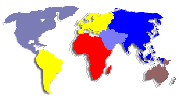|

Looters Ransack Baghdad‘s Antiquities Museum
By REUTERS
Filed at 9:00 a.m. ET BAGHDAD (Reuters)
- Looters have sacked Baghdad‘s antiquities museum, plundering treasures dating back thousands of years to the dawn of civilization in Mesopotamia, museum staff said on Saturday. They blamed U.S. troops for not protecting the treasures. Surveying
the littered glass wreckage of display cases and pottery shards at the Iraqi National Museum on Saturday, deputy director Nabhal Amin wept and told Reuters: „They have looted or
destroyed 170,000 items of antiquity dating back thousands of years...They were worth billions of dollars.“‘ She blamed U.S. troops, who have controlled Baghdad since the collapse of
President Saddam Hussein‘s rule on Wednesday, for failing to heed appeals from museum staff to protect it from looters who moved in to the building on Friday. „The Americans were
supposed to protect the museum. If they had just one tank and two soldiers nothing like this would have happened,‘‘ she said. „I hold the American troops responsible for what happened to this
museum.‘‘ The looters broke into rooms that were built like bank vaults with huge steel doors. The museum grounds were full of smashed doors, windows and littered with office paperwork and
books. „We know people are hungry but what are they going to do with these antiquities,‘‘ said Muhsen Kadhim, a museum guard for the last 30 years but who said he was overwhelmed by
the number of looters. „As soon as I saw the American troops near the museum, I asked them to protect it but the second day looters came and robbed or destroyed all the antiquities,‘‘ he said.
ARMED GUARDS
Amin told four of the museum guards to carry guns and protect what remained. Some of the museum‘s artifacts had been moved into storage to avoid a repeat of damage to other antiquities
during the 1991 Gulf War. It houses items from ancient Babylon and Nineveh, Sumerian statues, Assyrian reliefs and 5,000-year-old tablets bearing some of the earliest known
writing. There are also gold and silver helmets and cups from the Ur cemetery. The museum was only opened to the public six months ago after shutting down at the beginning of the 1991
Gulf War. It survived air strikes on Baghdad in 1991 and again was almost unscathed by attacks on the capital by U.S.-led forces. Iraq, a cradle of civilization long before the empires of
Egypt, Greece or Rome, was home to dynasties that created agriculture and writing and built the cities of Nineveh, Nimrud and Babylon -- site of Nebuchadnezzar‘s Hanging Gardens.
|



